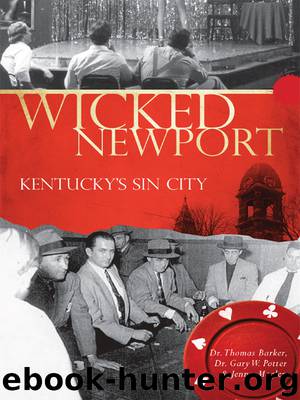Wicked Newport by Dr. Thomas Barker

Author:Dr. Thomas Barker
Language: eng
Format: epub
Publisher: Arcadia Publishing Inc.
Published: 2013-03-15T16:00:00+00:00
REFORM SYNDICATE STYLE
Attempts at reform came slowly in Newport. In the early 1950s, a group of clergymen in neighboring Kenton County hired Assistant Attorney General Jesse Lewis to investigate political corruption in Covington and Kenton County. Lewis filed suit against the Kenton County commonwealth attorney, alleging that he was engaged in nonfeasance with regard to the gambling laws. The judge hearing the lawsuit agreed and began disbarment proceedings against the commonwealth attorney.
On March 7, 1952, the state police raided the Lookout House located in Kenton County. They seized $20,000 in gambling equipment and arrested casino employees and patrons alike. The Cleveland Four made a quick decision. The Lookout House would not reopen. It was better to sacrifice one establishment to protect the others across the river in Newport, where state police interference was not likely to be tolerated. Jimmy Brink had not been present during the raid, so he had not been arrested. But his lucky streak was at an end. Brink, an accomplished pilot, died on August 6, 1952, while flying himself to Miami.
In Newport, the reform movement actually was better organized and more powerful. There was a good reason for that. Reform came to Newport courtesy of the Cleveland Four. Red Masterson, fully recovered from the Brady shooting, started meeting with local businessmen. Out of these consultations came the Newport Civic Association (NCA), which would raise the issue of gambling and prostitution, and field candidates for office, under the slogan of “Clean Up, Not Close Up.” The moderate businessmen recruited by Masterson were swayed by a longstanding tradition in Newport’s history—closing the casinos would hurt business. A Newport businessman reportedly made the comment, “Clean up this place and what have we got? A big plenty o’ nothing. Just plain nothing.”
With the syndicate’s bankroll funding the campaign, the Newport-style reformers swept the elections. And business continued. Peter Schmidt was still trying to build a gambling empire. Despite the election results, which put syndicate-backed reformers in office, Schmidt went ahead with a new project. Schmidt probably misread some events and thought there was an ongoing Cleveland Syndicate disengagement from Newport. Sam Tucker had moved to Miami in 1949 to oversee gambling interests in Broward County and Havana. Moe Dalitz had purchased the Desert Inn in Las Vegas from Wilbur Clark and seemed to be devoting his entire attention to that project. So Schmidt built yet another casino at 18 East Fifth Street, called the Glenn Schmidt Playtorium. The Playtorium was a one-story building with a restaurant, cocktail lounge, bowling alley and a basement casino. However, the Cleveland Syndicate was still well represented in Newport through their newly elected reform government. The “reformers” thought Schmidt’s opening of the Playtorium was just another act of defiance on his part. The Newport Civic Association members ordered a raid on Schmidt.
Schmidt’s ally, Charles Lester, retaliated by arranging a raid on the Cleveland Four’s Merchants Club. Lester found a detective named Jack Thiem willing to take charge of the raid. Thiem’s exact role in the Newport drama is unclear.
Download
This site does not store any files on its server. We only index and link to content provided by other sites. Please contact the content providers to delete copyright contents if any and email us, we'll remove relevant links or contents immediately.
| Crime & Criminals | LGBT |
| Special Needs | Women |
We're Going to Need More Wine by Gabrielle Union(19046)
Pimp by Iceberg Slim(14506)
Bombshells: Glamour Girls of a Lifetime by Sullivan Steve(14073)
The Radium Girls by Kate Moore(12028)
Becoming by Michelle Obama(10026)
Educated by Tara Westover(8054)
The Girl Without a Voice by Casey Watson(7889)
Wiseguy by Nicholas Pileggi(5784)
Hitman by Howie Carr(5095)
The Wind in My Hair by Masih Alinejad(5095)
The Rules Do Not Apply by Ariel Levy(4969)
Hunger by Roxane Gay(4927)
On the Front Line with the Women Who Fight Back by Stacey Dooley(4872)
Year of Yes by Shonda Rhimes(4757)
The Borden Murders by Sarah Miller(4325)
Papillon (English) by Henri Charrière(4274)
Joan of Arc by Mary Gordon(4110)
American Kingpin by Nick Bilton(3886)
Patti Smith by Just Kids(3777)
